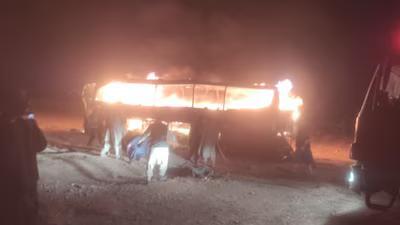
71 Killed in Bus Crash Involving Afghans Deported from Iran
A devastating bus crash in western Afghanistan has left at least 71 people dead, including migrants who had been deported from Iran just days ago. The accident occurred on Tuesday when a passenger bus carrying refugees, recently returned from Iran, collided with a truck and motorcycle, causing the vehicle to catch fire.
According to authorities, the bus was traveling from the Herat city border crossing with Iran to the western city of Herat when the accident happened. The crash is believed to have been caused by excessive speeding and reckless driving, with multiple vehicles involved in the incident.
The bus was reportedly carrying refugees who had been forcibly deported from Iran, where they had been living and working in the hope of a better life. The deported migrants, mostly from Afghanistan and other neighboring countries, had been sent back to their home countries after failing to register or had overstayed their visa.
The accident occurred on the same day that Iranian Minister of Interior Eskandar Momeni announced that a further 800,000 people would have to leave the country by next March. The migrant crisis in Iran has been escalating in recent years, with thousands of people being deported back to their home countries every year.
The tragedy highlights the plight of migrant workers who are often vulnerable and exploited in the countries they flee to, only to be met with harsh treatment and mistreatment upon their return. The circumstances of the crash and the lives of the migrants involved are a stark reminder of the humanitarian crisis unfolding in the region.
The bus crash is the deadliest accident in Afghanistan in years, and it has sent shockwaves throughout the country. The Afghan government has launched an investigation into the incident and has promised to provide assistance to the families of the victims.
The incident also raises concerns about the safety and security of migrant workers in the region. Migrant workers often face abuse, exploitation, and violence at the hands of traffickers, corrupt officials, and other predators. The crash highlights the urgent need for governments and international organizations to take action to protect the rights and dignity of migrant workers.
In recent years, the situation for migrant workers in Iran has become increasingly dire. Many have been forced to live and work in dire conditions, with limited access to healthcare, education, and other basic services. The deportation of migrant workers has also been linked to human rights abuses, including arbitrary detention, torture, and violence.
The international community has called for greater protection and assistance for migrant workers in the region. The United Nations High Commissioner for Refugees (UNHCR) has urged governments to provide safe and legal pathways for migration, and to protect the rights and dignity of migrant workers.
The accident is also a devastating reminder of the human cost of conflict and political instability in the region. Wars, political repression, and economic instability have forced millions of people to flee their homes, seeking safety and stability in other countries.
The Afghan government has announced that it will provide financial assistance to the families of the victims, and has launched an investigation into the incident. The Iranian government has also issued a statement regretting the incident and offering condolences to the families of the victims.
As the international community mourns the loss of lives, it must also take action to address the root causes of the crisis and provide greater protection and assistance to migrant workers in the region. The crash is a stark reminder of the urgent need for greater solidarity and cooperation in addressing the humanitarian crisis unfolding in the region.
In conclusion, the bus crash involving Afghans deported from Iran is a devastating reminder of the human cost of conflict, political instability, and migration. The crisis highlights the urgent need for greater protection and assistance for migrant workers in the region, and the need for governments and international organizations to take action to address the root causes of the crisis.



